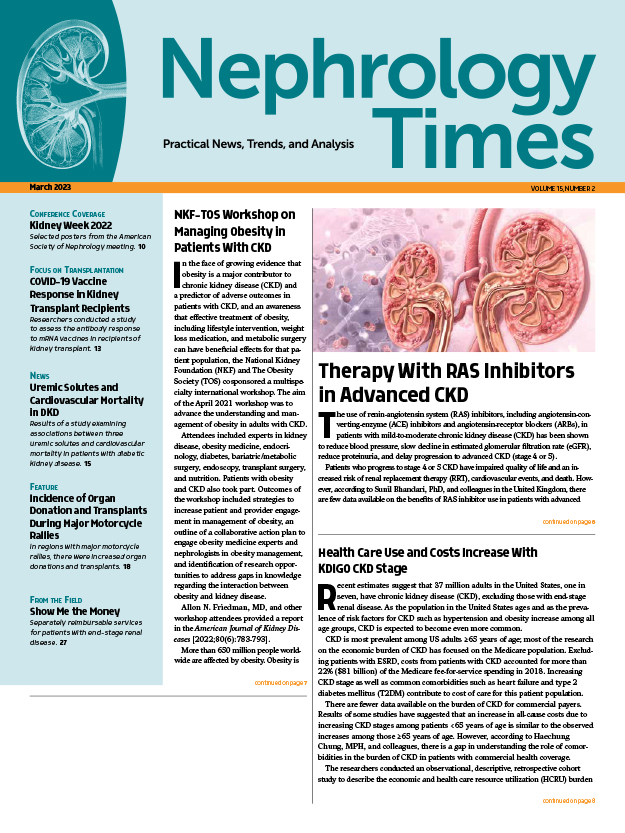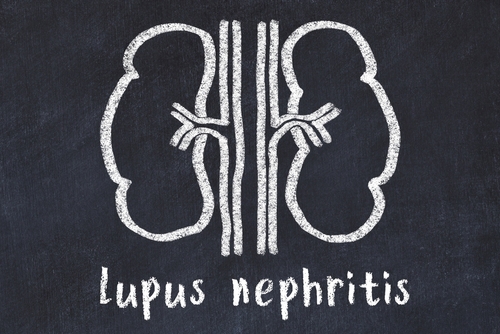
Patients with heart failure with reduced ejection fraction (HFrEF) commonly experience reduced kidney function, a condition associated with adverse clinical outcomes. Further, there is also an association between declines in estimated glomerular filtration rate (eGFR) over a period of months and increased risk of mortality and cardiovascular events. Previous studies have focused on the risk factors associated with short-term declines in eGFR, such as those that occur during hospitalization for acute heart failure.
One of the most common reasons for hospitalization with acute heart failure is volume overload, which has been shown to be a risk factor for poor clinical outcomes. A greater degree of congestion at the time of admission for acute heart failure is associated with a higher risk of poor cardiovascular and renal outcomes. Previous studies have demonstrated an association between decongestion (fluid removal) and decreased risk of mortality.
There are few data available on the risk factors for longitudinal declines in eGFR in patients with HFrEF. Wendy McCallum, MD, MS, and colleagues conducted a post hoc analysis of trial data to assess whether the rate of in-hospital decongestion is associated with longer-term kidney function decline. Results were reported in the American Journal of Kidney Diseases [2022;80(1):65-78].
The analysis utilized data from the EVEREST (Efficacy of Vasopressin Antagonism in Heart Failure Outcome Study with Tolvaptan) trial. Eligible patients had two or more kidney measures: one at discharge and at least one additional kidney assessment postdischarge.
The exposure of interest was the in-hospital rate of change in assessments of volume overload (B-type natriuretic peptide [BNP], N-terminal pro-B-type natriuretic peptide [NT-proBNP], and clinical congestion score [0-12]), and the rate of change in hemoconcentration, including measures of hematocrit, albumin, and total protein. The primary outcome of interest was incident chronic kidney disease GFR category 4 or 5 (CKD G4-G5), defined by a new eGFR of ≤30 mL/min/1.73 m2. The secondary outcome of interest was decline in eGFR of >40%.
A total of 3500 patients who met eligibility criteria were included in the analysis. Median follow-up was 10.1 months. Patients had a median of eight measures of creatinine over the duration of the follow-up period.
Patients were stratified into quartiles based on slope of BNP and slope of hematocrit. Patients in BNP quartile 1 had the least rapid decline and even some increase (least negative or positive slope), and those in quartile 4 had the fastest decline in BNP (most negative slope). Overall, 71% of the patients had hypertension, 38% had diabetes, and median eGFR at discharge was 55 mL/min/1.73 m2.
The majority of patients had declines in measures of volume overload and increases in measures of hemo-concentration. Those with the least rapid rates of decongestion (quartile 1) tended to have evidence of greatest volume overload, with higher baseline BNP and NT-proBNP at randomization and higher congestion score. They also tended to have lower hematocrit, albumin, and total protein. There were no differences in discharge eGFR among patients with more rapid or less rapid decline in BNP or hematocrit.
There was a linear relation between greater rate of decrease in BNP, NT-proBNP, and congestion score with lower risk of incident CKD G4-G5. There was an association between a more rapid decline in BNP and a lower hazard for incident CKD G4-G5 in both unadjusted and adjusted analyses. The adjusted hazard ratio (aHR) for incident CKD G4-G5 was 0.68 (95% CI, 0.58-0.79).
In comparison with the quartile with the slowest decline in BNP, quartiles with more rapid decline were associated with lower hazard of reaching incident CKD G4-G5. The pattern was similar for NT-proBNP. There was also an association between a more rapid decline in congestion score and lower hazard for incident CKD G4-G5 (HR, 0.82; 95% CI, 0.71-0.94) per every standard deviation (~1 point) decrease per week. The association grew stronger following adjustment for the baseline congestion score.
For the secondary outcome, the associations between the slopes of decrease in BNP, NT-proBNP, and congestion score were similar. There were associations between greater rates of decrease in BNP, NT-proBNP, and congestion score and lower hazard of decline in eGFR of >40%.
In both unadjusted and adjusted analyses, there was a linear relation between greater rate of increase in hematocrit, albumin, and total protein with lower risk of incident CKD G4-G5. In unadjusted analyses, there was a trend toward more rapid increase in hematocrit being associated with lower hazard for incident CKD G4-G5. The association grew stronger and reached statistical significance in adjusted analyses (adjusted HR, 0.73; 95% CI, 0.64-0.84) per every standard deviation (~1%) increase in hematocrit per week.
Compared with the quartile with the slowest increase in hematocrit, there were associations between quartiles with more rapid increase and lower hazard of reaching incident CKD G4-G5. The pattern was similar for albumin and total protein.
The authors cited some limitations to the analysis results, including the possibility of residual confounding, and lack of data on kidney parameters such as albuminuria or dose titration of angiotensin-converting enzyme inhibitors/angiotensin II receptor blockers.
In summary, the researchers said, “Among patients with HFrEF, more rapid rates of decongestion during hospitalizations for acute heart failure were associated with decreased risk of future kidney function decline. That is, more rapid declines in BNP, NT-proBNP, and clinical congestion score or more rapid rates of decongestion are not placing patients with HFrEF at risk for future kidney function decline.”
Takeaway Points
- In patients with heart failure with reduced ejection fraction, decongestion is associated with improved survival outcomes, but may be associated with decline in estimated glomerular filtration rate.
- Researchers reported results of a study to examine whether the rate of in-hospital decongestion is associated with longer-term kidney function decline.
- Study results suggested that there was no association between more rapid decongestion in patients with acute heart failure and the risk of adverse renal outcomes.







 © 2025 Mashup Media, LLC, a Formedics Property. All Rights Reserved.
© 2025 Mashup Media, LLC, a Formedics Property. All Rights Reserved.